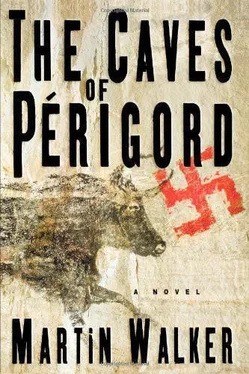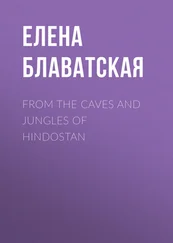Martin Walker - The Caves of Perigord
Здесь есть возможность читать онлайн «Martin Walker - The Caves of Perigord» весь текст электронной книги совершенно бесплатно (целиком полную версию без сокращений). В некоторых случаях можно слушать аудио, скачать через торрент в формате fb2 и присутствует краткое содержание. Жанр: Триллер, на английском языке. Описание произведения, (предисловие) а так же отзывы посетителей доступны на портале библиотеки ЛибКат.
- Название:The Caves of Perigord
- Автор:
- Жанр:
- Год:неизвестен
- ISBN:нет данных
- Рейтинг книги:4 / 5. Голосов: 1
-
Избранное:Добавить в избранное
- Отзывы:
-
Ваша оценка:
- 80
- 1
- 2
- 3
- 4
- 5
The Caves of Perigord: краткое содержание, описание и аннотация
Предлагаем к чтению аннотацию, описание, краткое содержание или предисловие (зависит от того, что написал сам автор книги «The Caves of Perigord»). Если вы не нашли необходимую информацию о книге — напишите в комментариях, мы постараемся отыскать её.
The Caves of Perigord — читать онлайн бесплатно полную книгу (весь текст) целиком
Ниже представлен текст книги, разбитый по страницам. Система сохранения места последней прочитанной страницы, позволяет с удобством читать онлайн бесплатно книгу «The Caves of Perigord», без необходимости каждый раз заново искать на чём Вы остановились. Поставьте закладку, и сможете в любой момент перейти на страницу, на которой закончили чтение.
Интервал:
Закладка:
“Where did young Francois want to take the guns? Did he know a place?”
“Oh, he had places everywhere, that one. He knew everybody, all the farmers and their sons, and most of the daughters too, knowing young Francois. I suppose he knew old Dumonteil, up on the ridge. The Germans deported him, and burned the farm. But we’d never have got the carts up there. Young Francois must have had somewhere else nearby, some little cave or hollow. He knew it all like the back of his hand, because of his hunting. He was a great one for hunting as a boy. Still is, come to that. You can have all these political crises up in Paris, and he’ll still come down here and take a day or two hunting the becasse with me. The best hunting in the world, he calls it, the fastest, most cunning bird of them all. Even round here, he can still show me little corners that I don’t know, where he says we might get lucky, and sure enough, there’s a becasse .”
“Maybe the guns were just abandoned that night, with all the fighting and the argument,” Clothilde pressed.
“Oh no, we’d never do that. And anyway, I know we got some of the stuff that night because le capitaine had promised us some of those new wonder drugs, sulfa drugs they called them, for our medical supplies. And I know we got that because they used it on me when I got shot later on at Terrasson, when that Das Reich division came through. About a week or ten days later, it must have been. I remember it very well. It was a powder, and they sprinkled it on my shoulder where the bullet had gone through. Strapped me up with a bandage, and told me I was as good as new. I wasn’t, mind, but young Francois said since it was my left shoulder, and that didn’t stop me firing a gun. I was young then, and healed fast, and it was all so exciting that you couldn’t stop. That’s where your dad was killed, Terrasson.”
“Where did young Francois get the sulfa powder from? Where had he kept it?”
“He gave some of us a medical kit to carry with us. I remember Lespinasse had one, because he had to use it at Terrasson. Young Francois was using that Citroen car by then, the one he’d pinched from the Milice in le Buisson. The old traction-avant with the running boards. It was a lovely car, that. He’d pile five or six of us in, guns and all, ammo in the trunk, and those medical kits he made up, and off we’d go. The mobile reserve, he called it. That was a joke, because the real Mobile Reserve was the Vichy one. Real bastards, they were. He always made sure we had some medicinal brandy in the back of the Citroen, brandy and cigarettes. He couldn’t do without his cigarettes, young Francois. That’s how we got to Terrasson, in that Citroen. We had to make a detour round Rouffignac, because the Germans had burned it.”
“Was the English capitaine with you at Terrasson?” asked Lydia.
“I don’t know, mademoiselle, I don’t remember seeing him. He didn’t come in the Citroen. He used one of the trucks we got from the Falange, a nasty bunch of North Africans. Sort of police, based in Perigueux, led by a real bastard called Villeplana, used to be a professional football player. We ambushed them and got one of their trucks. Le capitaine was off a lot around that time, attacking all the German petrol dumps so the Das Reich couldn’t refuel. He took us in the mobile reserve along on one attack on the big fuel bunkers they kept at the Roumanieres airbase. That was just before Terrasson. He might have come along with us after that to Terrasson, but I don’t remember. Sorry. It was all a long time ago.
“Do you want me to show you the place where we hid, the camp the Germans found?” he went on. “It’s just down the track and through the woods, near the old entrance to the Gouffre, the one where they had the horse with the long rope that would let people standing in this giant bucket down into the cave. I think the people at the Gouffre are using it again, if you pay extra. No horse now, of course. An electric winch.”
He took them around to the barn, where a muddy Land Rover was parked. They drove down the road toward le Bugue for half a mile before turning off on a rutted farm track, and then into the woods along a track that Lydia could not begin to discern. The big car heaved and jolted, splashing through a thick stretch of bog, before Albert began climbing again. He swung the wheel sharply to avoid a big oak tree and parked below a sudden outcrop of smooth limestone.
“This was it,” he said. “You see the borie over there.” He pointed to a low, circular stone hut, little more than a ruin now, its roof gone and saplings growing through it. “That’s where le capitaine slept, him and young Francois, and where they kept the ammo. Then we had the cave.” He plunged forward to the rocks, shouted to Clothilde to bring the torch, and began pushing through a tangle of bushes. Lydia looked with dismay at her clothes, saw Clothilde smile and shrug, and they followed the old man in.
With the torch, they could see it was more overhang than cave, no deeper than five meters, but about thirty meters long with a low roof and dry, gritty floor. The inner walls were smooth, and there were no gaps, only some curious scars in the rock. Clothilde moved forward intently, to see if they were ancient engravings, and Albert said, “That’s the German cannon.” Then he steered the torch to one side, where the cave wall and floor had been charred black. “Flamethrower,” he said. “They didn’t get us. We’d left by then. One of Berger’s rules. Never too long in the same place.” He stood in silence for a while, remembering.
“Were there any other caves you used, Albert?” Clothilde asked, gently. “I’m looking for one where there may have been some of the old cave paintings.”
“The big one at Rouffignac, of course, the one where they have the train. We used that a bit. And a couple of the ones near Les Eyzies, but only for the odd night because they were so well known. The Germans just had to use a tourist map and they’d had found us. We slept in Combarelles once, but never stored anything there. Young Francois took us to a couple near la Micoque, on the way up to Rouffignac, but they were like this, more overhangs really. I never saw any paintings.”
“Could you find them again?”
“Oh yes, I think I could, But you ought to ask young Francois. You and he were very close once,” he said kindly.
“He’s a busy man, Albert.”
“Sure, I’ll take you. But you’ll find no paintings.”
“I might find a midden, one of their old rubbish tips and latrines. You can find out a lot from latrines, Albert. Like what they ate, and what kind of tools they used. You can measure the pollen and tell what the weather was like.”
“Ice Age, wasn’t it?”
“Not all the time. The time I’m mostly interested in, when they were doing the cave paintings at Lascaux, it was pretty much the same climate as now, a thousand-year-long warm period between the cold spells. They had trees and brambles just like these.” She led the way back to the car, chatting about the tools they made from reindeer antlers until they reached the farm. He insisted on giving her a box of eggs and a bottle of his homemade pineau, and waved them off, calling, “See you at the market, and give my best to your mum.”
Manners’s face was brick red from his day in the sun, and Horst looked exhausted, when they found them on the terrace of the Cro-Magnon Hotel. They were drinking pastis, and nibbling olives, and Horst ordered them some drinks while Manners described the search pattern they had followed on the large-scale map. Clothilde leaned over the map and told them Albert’s story, of the flight down the track with the cart, and the row in the hollow by the road, and the booby-trap Manners’s father had set with the grenade.
Читать дальшеИнтервал:
Закладка:
Похожие книги на «The Caves of Perigord»
Представляем Вашему вниманию похожие книги на «The Caves of Perigord» списком для выбора. Мы отобрали схожую по названию и смыслу литературу в надежде предоставить читателям больше вариантов отыскать новые, интересные, ещё непрочитанные произведения.
Обсуждение, отзывы о книге «The Caves of Perigord» и просто собственные мнения читателей. Оставьте ваши комментарии, напишите, что Вы думаете о произведении, его смысле или главных героях. Укажите что конкретно понравилось, а что нет, и почему Вы так считаете.












